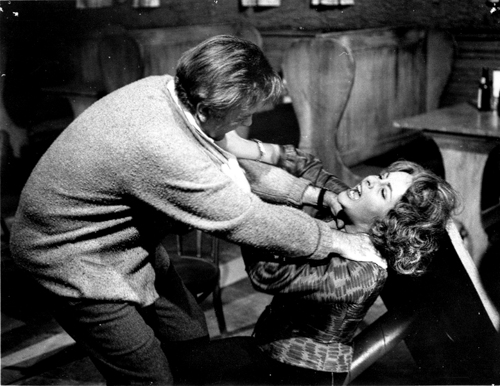As premises go, “Two wobbly drunks holler obscenities, choke each other out and smash glasses” sounds like sweeps season on Basketball Wives. But when said premise features dialogue from Edward Albee, direction from Mike Nichols and knockout performances from Elizabeth Taylor and Richard Burton, it garners five Academy Awards and secures a spot on the American Film Institute’s 100 Greatest Films of All Time.
War of the words
As premises go, “Two wobbly drunks holler obscenities, choke each other out and smash glasses” sounds like sweeps season on Basketball Wives. But when said premise features dialogue from Edward Albee, direction from Mike Nichols and knockout performances from Elizabeth Taylor and Richard Burton, it garners five Academy Awards and secures a spot on the American Film Institute’s 100 Greatest Films of All Time.

Who’s Afraid of Virginia Woolf? (1966), which is showing this weekend at 5th Avenue Cinema, rises to high art because it turns intoxicated, noxious, 3 a.m. knock-down drag-outs into a high-class war of words replete with clever literary references, mile-a-minute puns and some Latin, for good measure.
The film is to drunken arguments what Seinfield is to bantering in a coffee shop: No one actually talks like this, but that’s the point. Wouldn’t life be a helluva lot better if those messy, desperate, liquor-ridden nights were scripted by a Tony Award winner? If they were a little less Real World AND a little less real world?
The script was adapted from Edward Albee’s 1961 play of the same name by Ernest Lehman (North By Northwest, The King & I). The film adheres closely to the theatrical version (Lehman changed only two lines, the story goes, to the tune of $125,000 per line), which is a pleasant respite from typical 21st century cinema: Scenes are long and winding, and we see the characters fully interacting with their habitat and with each other.
Like many films of its era, Who’s Afraid of Virginia Woolf? feels at once like a piece of filmmaking and a textured work of literature. There isn’t a wasted image, and every word is squarely and sublimely in place.
Burton (Cleopatra, Becket) and Taylor (Cleopatra, Cat on a Hot Tin Roof) star as George and Martha. He is a history professor at a small New England college, and she is the daughter of its president.
The film begins at 2 a.m., post-party, which is about as inauspicious as opening scenes get. George and Martha are both thoroughly in-slop-sicated (you heard me), and the middle-aged couple’s booze-soaked mutual antipathy oozes from the first frame. As Martha tidies up—which, for her, consists of putting dirty plates in the nightstand and stuffing soiled laundry under the bedspread—she and George trade highbrow barbs. She attacks, he parries and we the audience slowly descend into the sad, drunken chasm that their home has become.
As the couple bickers and bitches, we come to find that Martha has invited over two new acquaintances she met at the faculty party: Nick and Honey, a young couple new to the university.
And thus goes the list of essential (and highly combustible) ingredients: George, a silver-tongued, silver-haired associate professor of history; Martha, a bored housewife and son of the college president; Nick, a young and promising biology professor; Honey, an affable, slim-hipped blonde; a cluttered old house; and most importantly, prodigious amounts of booze. (I’d love to take a look at Albee’s script; the phrase “[fill in the blank] walks to bar and fixes drink” must appear at least two dozen times.)
Albee’s original play was set entirely in George and Martha’s home and consisted of these four characters, and director Nichols (The Graduate, Closer) hews closely to it. He only deviates once, by pulling the characters from the house for a swerve-happy sojourn to a bar where they meet a bar and a bartender, giving the film a grand total of six characters. But his adherence to the source material—specifically, the whip-smart dialogue—was a wise choice for the first-time filmmaker.
In hindsight, it’s easy to interpret Burton and Taylor’s scenes as a microcosm of their high-profile and disastrous marriage(s). (Let’s just say Burton probably didn’t have to go full method for the role of alcoholic George, considering he was allegedly consuming up to three bottles of vodka a day.) Portraying the acrimonious couple certainly couldn’t have helped matters, for these two characters are downright mean. Martha gets in the best jabs (the way she spits out “associate professor” will make anyone pursuing a career in academia shudder), and it’s a testament to the script’s power that the punches still sting.
Many movies deemed vulgar and profane 55 years ago feel hopelessly outdated today (it is slightly odd never to hear someone drop an F-bomb during a marital dispute that involves frat-party levels of liquor), but George and Martha’s unadulterated disdain for each other is palpable regardless of the language.
George Segal (Just Shoot Me!) and Sandy Dennis (The Out-Of-Towners) prove to be admirably game as Nick and Honey. They become embroiled in George and Martha’s toxic mess, finding themselves gradually transformed from blue-eyed, blonde-haired Middle-Westerners to pawns in the older couple’s sad, desperate game.
Taylor, Burton, Segal and Dennis all received Oscar nominations, and it’s exhilarating to watch Nichols simply train his camera on four top-notch actors, letting them recite such brilliant, acerbic words. Taylor and Burton offer a master course in manipulation, and it may be worth taking notes for your next intoxicated imbroglio.
Who’s Afraid of Virginia Woolf? (1966)
Friday, Feb. 10, and Saturday, Feb. 11, at 7 and 9:30 p.m.
Sunday, Feb. 12, at 3 p.m.
Free for PSU students and faculty with ID; $2 all other students and seniors; $3 general admission






